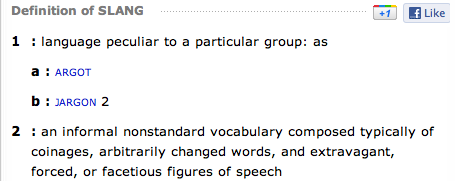|
ESL Forum:
Techniques and methods
in Language Teaching
Games, activities
and teaching ideas
Grammar and
Linguistics
Teaching material
Concerning
worksheets
Concerning
powerpoints
Concerning online
exercises
Make suggestions,
report errors
Ask for help
Message board
|
ESL forum >
Techniques and methods in Language Teaching > Discussion Point: Slang in the ESL Classroom
Discussion Point: Slang in the ESL Classroom
|

douglas

|
Discussion Point: Slang in the ESL Classroom
|
|
Good Morning (evening, etc.),
A recent post got me thinking about the use of slang in the ESL classroom. I was surprised to find how adamant some are about it not belonging there, so I did a little research and came upon this interesting essay by Jon Lieb:
It�s a little long, but a good read. Once you have read it, I would be interested to hear your opinions on this subject. A few key points/questions he addresses are:
-L2 speakers that learn only {proper}written English are "unable to cope with natural English"
-learning slang enhances informal communications, which allows users to more closely connect with other members of a group
-two types of student motivation: integrative vs instrumental
-is SMS slang?
-teaching slang must "incorporate clear instruction on its correct pragmatic usage."
Looking forward to your thoughts,
Douglas
|
15 Feb 2012
|
|
|
|

Mariethe House

|
Interesting topic!
First I wouldn �t mix up slang and colloquialisms or idiomatic expressions. The latter are necessary if you want to show a good understanding and mastery of the foreign language.And you mustn �t confuse the differant registers of language: "formal, informal, familiar and slang"
The familiar conversation between 2 young people that you point out as an example , Douglas, to me is not slang but idiomatic language.
Slang to me is more on the rude side. I can �t imagine myself explaining Lady �s Gaga �s words that Philip mentionned in the previous post to teenagers. I wouldn �t do it in my own language!
I would feel really embarrassed, not because of the language but because of the degree of intimacy it implies! I never would be so close affectively to my students!
How should they learn, ?It has to be in a particular context with young people of their age.
We, as teachers , can teach colloqialisms, more familiar language but slang brings too close a relationship between teacher and kids which is not acceptable!
Sms is an interesting form of language which we can �t but teach ! It is so much part of the youngsters � world! Or maybe, they can teach us!!
|
15 Feb 2012
|
|
|

douglas

|
Interesting point Marie, I sometimesd wonder where the word "slang" got such a bad rap. Oxford defines it as:
Words and expressions that are informal and not standard English. Different social groups often use a special vocabulary. Sometimes this is fairly widespread and well understood. In the sentences that follow the slang expressions are in bold type.
If Martin is prepared to take the risk, he could be quids in.
I just wanted to be sure you weren�t trying to pull a fast one on me.
I�m a bit skint at the moment.
Some slang is confined to small tightly knit groups who can use it to exclude outsiders. Slang is also often sexual or scatological.
Colloquialism is also often given as a synonym to slang.
I can fully understand your concerns about teacher-student relations. I think there is a big difference between teaching for a "formal" educational institution (e.g. govt. schools) and for private institutions where English is the sole subject. |
15 Feb 2012
|
|
|
|
|

almaz

|
|
Good topic, Douglas. I �d agree with Mariethe, though, that the writer (not Douglas - as far as I can see, Mariethe) doesn �t give a sufficiently rigorous definition of the word �slang �. Since he mentions Webster �s, perhaps it �d be an idea to look at its entry for the word:
(By the way, David Crystal refers to slang as �the most colloquial variety of language �, although he says they are not synonyms) So much for the definition. As far as function is concerned, Eric Partridge gives 15 different uses of slang (Dictionary of Slang and Unconventional English), so it �s certainly not an area which can be airily dismissed. Also, as Douglas has pointed out, many slang words pass into standard usage (clever, fun, mob etc) while some standard words go in the opposite direction (arse, for example). As grown-up teachers of language, we should know when and where it �s appropriate to teach or discuss this very natural aspect of language. |
15 Feb 2012
|
|
|

almaz

|
|
PhilipR, I see your Daily Mail and raise you a Language Log:
(the links to Lourenson here and here are definitely worth reading - if you have the time) |
15 Feb 2012
|
|
|

sijorumo

|
|
Interesting! I think it�s quite important to
teach slang and idioms because they are part of the English language and native
speakers use them in everyday conversations. If we just teach formal language,
learners will find some difficulties in understanding everyday speech, they
could understand most of the conversations but have quite a hard time
understanding seemingly nonsensical phrases and words. That�s why it�s
important to teach idioms and slang, well at least provide learners with a
basic knowledge of these expressions.
I found this on a page and I think it�s relevant: �knowing
the idioms and slang that the everyday English speaker uses will actually open
many doors for the English Language Learner�.
|
15 Feb 2012
|
|
|
|
|

ueslteacher

|
|
I guess, it �s only logical to mention the notion of register in terms of appropriate language in different contexts.
BTW @Alex: so far we have heard opinions on the word "cuckold" from Australians and Americans who mentioned that it �s hardly ever used anymore, and I �d like to ask you as a person from the UK if the same goes for the UK, as the dictionary I consulted didn �t provide that info.
Sophia
|
15 Feb 2012
|
|
|

douglas

|
|
Interesting text Sophie-- the definition of register seems to border on that of jargon (but not quite).
Marie- Fun site. thanks
sijorumo-I agree with that quote 100%
Alex.-I like "this very natural aspect of language"
Phillip- I wonder how succcessful they will be, I can �t imagine how they really intend to enforce the policy. "Chill! The speech cops are coming! Oh, I mean: Please direct your attention to the fact that the authorities that enforce this educational institution �s policies on proper use of English are advancing in our direction."
So, should we teach slang in the classroom? If so, to what extent? If not, how do we deal with students using (or misusing) slang in the classroom?
Douglas |
16 Feb 2012
|
|
|
















